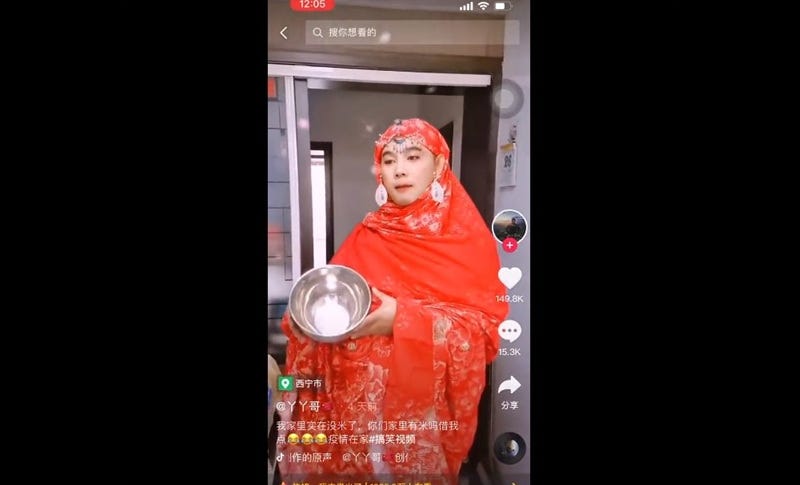Chinese Adopt Bollywood Disco Song as Protest AnthemCovid crackdown inspires new euphemisms to express dissentBy: Neeta LalMillions of Chinese are using the superhit Bollywood number -- “Jimmy, Jimmy, Jimmy, aa ja, aa ja” -- from the 1982 film `Disco Dancer’ as a protest anthem to rebel against the draconian restrictions imposed by the Xi Jinping government to control the Covid-19 outbreak in the country. Hordes of locked-down Chinese nationals have uploaded the iconic song’s videos on the Chinese social media network Douyin -- the Chinese name for TikTok -- where they can be seen lip syncing to the Hindi number brandishing empty bowls and pans to highlight their deprivation of essential food items during the lockdowns. The song in China is recreated in Mandarin as ‘Jie mi, jie mi’, which translates as "Give me some rice? Who can help me? I had run out of it. No need to give much rice, my family has only a few members." It can be heard here. With Chinese censors quick to go after language on the internet expressing frustration or irritation with the systems, indefatigable protesters use codewords that constantly change as the censors shut them down. “It has reached the point where a simple understanding of Chinese vocabulary, syntax, and grammar is no longer enough to fully understand Chinese Internet discourse,” according to a website called the Internet Monitor. On today’s Chinese Internet, fully comprehending the language requires a thorough knowledge of current events, a deep respect for historical implications, an agile mastery of cultural conventions, and more often than not, a healthy appreciation of topical humor.” While one video that has garnered over 10 million views, shows a man dressed as a woman in a colorful outfit and headgear singing the number with an empty rice bowl in hand, another depicts a housewife swaying to the song’s beat with exaggerated, theatrical gestures. Kids, too, have joined in the online protests by crooning their own versions. Several Chinese cities including Shanghai; population over 25 million, continue to be under a strict clampdown to contain Covid numbers. Even though infection cases are under control, residents have been forced to remain indoors for weeks while grappling with food and other shortages. Those protesting the policy measures face severe crackdowns by security officials, evident from thousands of videos that have surfaced online showing cops mishandling the public including women. The Chinese Covid policy has also had economic ramifications. “In March, an estimated 345 million people across 46 Chinese cities were in full or partial lockdowns, a population accounting for 40 percent of GDP," said the Center for Strategic and International Studies in a report. Foreign companies have also been at the receiving end of the Chinese government’s oppressive covid policies. A large number of workers jumped fences at Foxconn's assembly site for Apple iPhone in Zhengzhou city to escape the government’s `Zero Covid' rules. Denied transport services, they had to trudge for several kilometers to leave the premises. Against this backdrop of oppression and angst, sociologists say, people are resorting to creative ways to rebel. And since Indian movies have always enjoyed huge popularity in China, the phenomenal success of Jimmy Jimmy is hardly surprising. Back in the 1950s and ‘60s, legendary film stars such as Raj Kapoor enjoyed enormous popularity in China. More recently, the smashing success of films such as "3 Idiots", "Secret Superstar," "Hindi Medium," "Dangal" and "Andhadhun" have drawn record attendance at Chinese theaters. Disco Dancer is musical drama, a rags-to-riches story of a young street performer. Jimmy Jimmy, featuring the protagonist Mithun Chakraborty, was a major hit, with fans following in Southern and Central Asia, Eastern and Western Africa, the Middle East, East Asia, Turkey and the Soviet Union. The song was written by composer and singer Bappi Lahiri, who died earlier this year. It also went on to become a cult hit in Russia and remains popular in Russia and Eurasian countries even today. Jimmy Jimmy was also featured in a 2008 Hollywood film titled “You Don’t mess with the Yohan.” “Indian music composers have never shied away from composing protest songs that capture popular imagination. Many of these songs reflect public angst against the ruling political dispensation or breakdown of law and order. Many also showcase the political climate in the country,” says Vishnu Jignesh, a Delhi-based music composer. Hindi cinema, adds Jignesh, has a rich tradition of poets and songwriters penning songs that beautifully capture protest movements. “The Chinese adoption of Jimmy Jimmy is the latest such example,” he says. In another case, the viral Tamil song (from India’s southern state of Tamil Nadu) "Enjoy Enjaami" by rapper Arivu and singer Dhee, was adopted by the Sri Lankans to express their disenchantment during the country’s economic crisis and the government's corruption. Cultural historians say that pop music’s link with protest movements goes back centuries and transcends geographies. “Popular songs often become protest anthems,” says Dr. Preetha Nair, associate professor, Political Science at Delhi University. “If you look at strong mass movements, be it the civil rights movement, the French Revolution, the Russian Revolution, or even the Cairo uprising, all of them had pop songs adopted by protestors which acted as their glue for solidarity. This also strengthened their message while putting pressure on respective governments.” This article is among the stories we choose to make widely available.If you wish to get the full Asia Sentinel experience and access more exclusive content, please do subscribe to us for US$10/month or US$100/year. |


